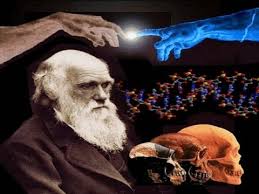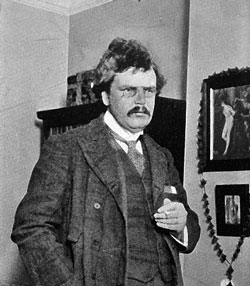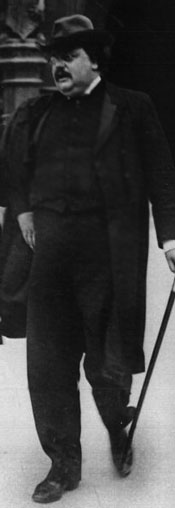
Published: 12 November 2008(GMT+10)
G.K. (Gilbert Keith) Chesterton (1874–1936) was a prolific British writer, whose poetry, fiction, books and essays argued for a Christian
1 worldview in the early 20
th century, long before the term ‘worldview’ was coined. He did this not only in traditional apologetics works (though some, like
Heretics and
Orthodoxy, may be categorized as such), but in everything, as he saw the potential for everything to be for or against Christ (cf.
Matthew 12:30). Many of his works addressing social and moral issues are still relevant today, as he was able to foresee the effects of many of the destructive influences of his day. His works were very influential on the thought of
Christian apologist and author C.S. Lewis (1898–1963).
The worship of science
As early as 1920, G.K. Chesterton argued against what he saw to be the worship of science (now sometimes called ‘
scientism’), which already was being invoked in education and ethics.
2 He also observed nearly a century ago that Darwinist scientists were more and more
turning their science into a philosophy.
3 These scientists were forbidden by their own belief system from believing in miracles,
regardless of where the evidence led. This led inevitably to scientists making bizarre claims as to what natural processes alone could accomplish. ‘Things that the old science at least would frankly have rejected as miracles are hourly being asserted by the new science.’
4
Chesterton conceded that these materialists were completely logical and reasonable in their belief system, but that it was a very small internal consistency which denied even the possibility of
miracles; their belief system explained everything by natural events, which can be logical enough (bearing in mind that there is a difference between logical consistency and truth), but because that was the central tenet of their ideology, they could not admit even one miracle. He argued that the orthodox Christian was freer than the materialist because Christians could believe in both natural and supernatural causes for events; Christianity can explain both physical laws and miracles. As Chesterton wrote:
As an explanation of the world, materialism has a sort of insane simplicity. It has just the quality of the madman’s argument; we have at once the sense of it covering everything and the sense of it leaving everything out.—Chesterton
‘The believers in miracles accept them (rightly or wrongly) because they have evidence for them. The disbelievers in miracles deny them (rightly or wrongly) because they have a doctrine against them.’5
This, he argues, makes for ‘a sort of insane simplicity’ to the materialist worldview:
‘As an explanation of the world, materialism has a sort of insane simplicity. It has just the quality of the madman’s argument; we have at once the sense of it covering everything and the sense of it leaving everything out. … He understands everything, and everything does not seem worth understanding. His cosmos may be complete in every rivet and cog-wheel, but still his cosmos is smaller than our world.’6
‘That modern intelligence which destroys itself’
Image from Wikipedia.com

G.K. Chesterton
Chesterton’s statements about evolution as a scientific theory are sometimes ambiguous and might even be taken as supportive of a
theistic evolutionary stance; for instance, he states that even if biological evolution were true, it would not mean that Christianity was false, because God is outside of time and could do things any way He wanted
7 (obviously, not a view that CMI would endorse; e.g. see
10 dangers of theistic evolution). However, other writings contain quite clear anti-evolution statements, especially when the implications of Darwinism are applied to philosophy. (One might also note that Chesterton’s anti-evolutionary statements are much more consistent with the rest of his thought and writing; and one can hardly expect such a large body of non-inspired writing to be entirely consistent or accurate!) He said of evolution so applied that it ‘is a good example of that modern intelligence which, if it destroys anything, destroys itself.’
7
One of Chesterton’s main complaints against Darwinism is that it was advanced as a fact long before it was even a well-established hypothesis (which some of Darwin’s eminent scientific contemporaries also pointed out, e.g.
German museum director, Dr Johann Blasius). Chesterton argued that it would have been more productive to discover ‘what is actually known about the variation of species and what can only plausibly be guessed and what is quite random guesswork’, but ‘the Darwinians advanced it with so sweeping and hasty an intolerance that it is no longer a question of one scientific theory being advanced against another scientific theory. … It is treated as an answer; and a final and infallible answer.’
8
He noted that even the most ardent evolutionists seemed hesitant in defending Darwinism in his day:
‘Huxley said, in his later years, that Darwin’s suggestion had never been shown to be inconsistent with any new discovery; and anybody acquainted with the atmosphere will be struck by the singular note of negation in that. When Huxley began to write, he certainly expected that, by the end of his life, Darwin’s suggestion would have been confirmed by a crowd of positive discoveries. Now nobody talks of it at present as a settled scientific law. Even the critic who complained of my own remark called Darwinism a “hypothesis”, and admitted that it had been “profoundly modified”. And he added the very singular and significant phrase: that the Darwinian hypotheses was still “that most sound at bottom.” If anyone does not hear the negative note in that, I think he does not know the sound of human voice.’9
‘If an ignorant man went about saying that the earth was flat, the scientific man would promptly and confidently answer, “Oh, nonsense; of course it’s round.” He might even condescend to give the real reasons, which I believe are quite different from the current ones. But when the private citizen rushes wild-eyed down the streets of Heliopolis, Neb., calling out “Have you heard the news? Darwin’s wrong!” the scientific man does not say, “Oh, nonsense, of course he’s right.” He says tremulously, “Not entirely wrong; surely not entirely wrong”; and we can draw our conclusions.’10
Anti-evolution arguments
Image from Wikipedia.com

G.K. Chesterton
Chesterton argued that ‘nobody need know any more than the mere rudiments of the biological controversy in order to know that, touching twenty incidental problems, [evolution] is in some ways a very unsatisfactory answer.’
8 Several of Chesterton’s arguments against evolution sound very much like modern creationist arguments:
‘I do not know the true reason for a bat not having feathers; I only know that Darwin gave a false reason for its having wings. And the more the Darwinians explain, the more certain I become that Darwinism was wrong. All their explanations ignore the fact that Darwinism supposes an animal feature to appear first, not merely in an incomplete stage, but in an almost imperceptible stage. The member of a sort of mouse family, destined to found the bat family, could only have differed from his brother mice by some minute trace of membrane; and why should that enable him to escape out of a natural massacre of mice? Or even if we suppose it did serve some other purpose, it could only be by a coincidence; and this is to imagine a million coincidences accounting for every creature. A special providence watching over a bat would be a far more realistic notion than such a run of luck as that.’11,12
Chesterton also questioned the usefulness of partially formed structures in animals; a wing that enables flight is undoubtedly an advantage to a creature, but a
half-formed wing is of no use. ‘Yet Darwinism pre-supposes that numberless generations could survive before one generation could fly.’
13
He also accuses the evolutionists of not having enough
evidence in the fossil record for their claims:
‘I do not demand anything, in the sense of complaining anything [sic] or the absence of anything. I am quite comfortable in a completely mysterious cosmos. I am not reviling the rocks or cursing the eternal hills for not containing these things. I am only saying that these are the things they would have to contain to make me believe something that somebody else wants me to believe. These traces are not things that the Anti-Darwinian demands. They are things that the Darwinian requires. The Darwinian requires them in order to convince his opponent of Darwinism; his opponent may be right or wrong, but he cannot be expected to accept the mere absence of them as proof of Darwinism. If the evidences in support of the theory are unfortunately hidden, why then, we do not know whether they were in support of the theory. If the proofs of natural selection are lost,14 why then, there are no proofs of natural selection; and there is an end of it.
And I would respectfully ask these critics what would be thought of a theological or miraculous argument which thus based itself on the very gaps in its own evidence.’13
If the evidences in support of the theory [of Darwinism] are unfortunately hidden, why then, we do not know whether they were in support of the theory.—Chesterton on the ‘missing links’.
Chesterton on evolutionary philosophy
As dubious as the scientific claims of evolution seemed to Chesterton, the
philosophic implications of Darwinism were to him the more dangerous threat. The first problem evolutionists have is that of how to relate to other creatures. Evolutionists may be very cruel to other animals; after all, under the doctrine of ‘survival of the fittest’, even the most gratuitous and painful actions can justified as helping natural selection along. Or on the opposite end of the spectrum (which is vastly more common today), an evolutionist may elevate animals to the status of humans, like those who wish to give
human rights to apes, on the basis that we are all related, so humans are not entitled to any special status.
Chesterton ably pointed out the follies of such Darwinian reality compared to the sane morality revealed in Scripture:
‘Darwinism can be used to back up two mad moralities, but it cannot be used to back up a single sane one. The kinship and competition of all living creatures can be used as a reason for being insanely cruel or insanely sentimental; but not for a healthy love of animals … That you and a tiger are one may be a reason for being tender to a tiger. Or it may be a reason for being cruel as the tiger. It is one way to train the tiger to imitate you, it is a shorter way to imitate the tiger. But in neither case does evolution tell you how to treat a tiger reasonably, that is, to admire his stripes while avoiding his claws.
‘If you want to treat a tiger reasonably, you must go back to the garden of Eden. For the obstinate reminder continues to recur: only the supernaturalist has taken a sane view of Nature. The essence of all pantheism, evolutionism and modern cosmic religion is really in this proposition: that Nature is our mother. Unfortunately, if you regard Nature as a mother, you discover that she is a stepmother. The main point of Christianity was this: that Nature is not our mother: Nature is our sister. We can be proud of her beauty, since we have the same father; but she has no authority over us; we have to admire, but not to imitate.’15
Not only have evolutionists failed to answer the relatively simple questions that Chesterton put forward, creationists have more arguments than ever against the increasingly contrived pro-evolutionary stance.
The more dangerous implication of evolutionism is how it permits us to treat our fellow man. Chesterton saw the possibility that the more powerful could use evolutionary arguments to exploit the disadvantaged—we have not seen his fanciful predictions of people bred exactly for their intended professions,
16 but the evolutionary philosophy did produce
eugenics in America and to an even more extreme degree in
Germany. There, ‘unfit’ individuals were forcibly sterilized, and in the case of the Nazi death camps, exterminated for the sake of what was seen to be the ideal for the human race. While few today would advocate such tactics, evolutionary philosophy has substantially devalued the human life, as can be witnessed by the millions of abortions which take place every year in America alone, especially if the baby has
Down’s Syndrome or some deformity—most of these handicapped children never had a chance to take their first breath. And there are evolutionists like
Eric Pianka and
John Reid who wouldn’t mind a drastic reduction in the human population to ‘save the planet’.
Chesterton was able to see how the ideas in his day might affect thought in the future, and argued against what he saw the consequences of such flawed ideas to be. It is revealing that in nearly a century since he penned his arguments against evolution and Darwinism, those same arguments are as relevant today as they were in the early 20
th century. Darwinism was open to serious attack then, and with the vast gain in scientific information, not only have evolutionists failed to answer the relatively simple questions that Chesterton put forward, creationists have more arguments than ever against the increasingly contrived pro-evolutionary stance, which has
resorted to teaching falsehoods to gain converts.
Staunch defender
Chesterton also successfully debated some of the leading anti-Christians of his day, such as George Bernard Shaw, H.G. Wells, Bertrand Russell and Clarence Darrow.
17 Against Darrow, he was much more successful than
William Jennings Bryan, winning the audience vote about 2–1. One report stated:
‘At the conclusion of the debate everybody was asked to express his opinion as to the victor and slips of paper were passed around for that purpose. The award went directly to Chesterton. Darrow in comparison, seemed heavy, uninspired, slow of mind, while G.K.C. was joyous, sparkling and witty …. quite the Chesterton one had come to expect from his books. The affair was like a race between a lumbering sailing vessel and a modern steamer. Mrs. Frances Taylor Patterson also heard the Chesterton–Darrow debate, but went to the meeting with some misgivings because she was a trifle afraid that Chesterton’s “gifts might seem somewhat literary in comparison with the trained scientific mind and rapier tongue of the famous trial lawyer. Instead, the trained scientific mind, the clear thinking, the lightning quickness in getting a point and hurling back an answer, turned out to belong to Chesterton. I have never heard Mr. Darrow alone, but taken relatively, when that relativity is to Chesterton, he appears positively muddle-headed.”
I was favorably impressed by, warmly attached to, G.K. Chesterton. I enjoyed my debates with him, and found him a man of culture and fine sensibilities.—Famous atheistic lawyer Clarence Darrow, who decisively lost a debate with him.
‘ … As Chesterton summed it up, he felt as if Darrow had been arguing all afternoon with his fundamentalist aunt, and the latter kept sparring with a dummy of his own mental making. When something went wrong with the microphone, Darrow sat back until it could be fixed. Whereupon G.K.C. jumped up and carried on in his natural voice, “Science you see is not infallible!” Whatever brilliance Darrow had in his own right, it was completely eclipsed. For all the luster that he shed, he might have been a remote star at high noon drowned by the bright incandescent light of the sun. Chesterton had the audience with him from the start, and when it was over, everyone just sat there, not wishing to leave.
…
Ostensibly the defender of science against Mr. Chesterton, [Darrow] obviously knew much less about science than Mr. Chesterton did; when he essayed to answer his opponent on the views of Eddington and Jeans, it was patent that he did not have the remotest conception of what the new physics was all about.’18
Yet these opponents greatly respected him and considered him a friend. This would be like Richard Dawkins expressing warm friendship towards Henry Morris at a much later time. For example, Shaw said:
‘The world is not thankful enough for Chesterton.’
And Darrow wrote:
‘I was favorably impressed by, warmly attached to, G.K. Chesterton. I enjoyed my debates with him, and found him a man of culture and fine sensibilities.’
....
Taken from:
http://creation.com/gk-chesterton-darwinism-is-an-attack-upon-thought-itself
Recommended Resources

